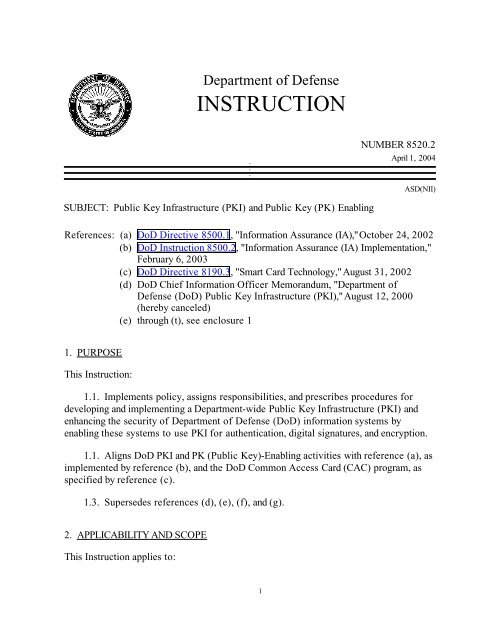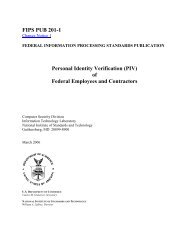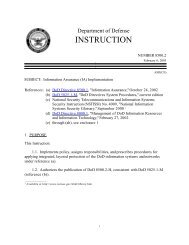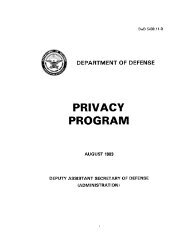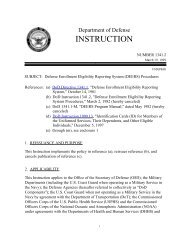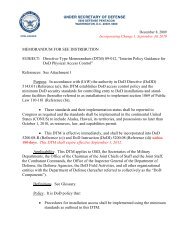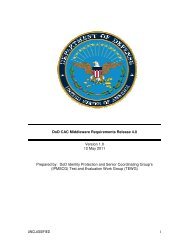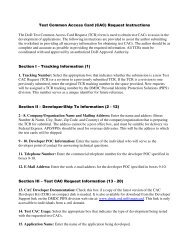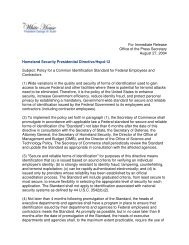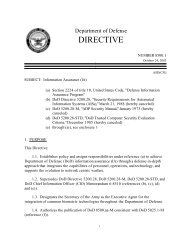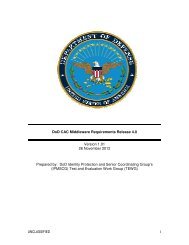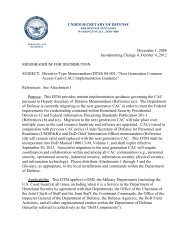DoD Instruction 8520.2, April 1, 2004 - Common Access Card (CAC)
DoD Instruction 8520.2, April 1, 2004 - Common Access Card (CAC)
DoD Instruction 8520.2, April 1, 2004 - Common Access Card (CAC)
Create successful ePaper yourself
Turn your PDF publications into a flip-book with our unique Google optimized e-Paper software.
Department of Defense<br />
INSTRUCTION<br />
NUMBER <strong>8520.2</strong><br />
<strong>April</strong> 1, <strong>2004</strong><br />
SUBJECT: Public Key Infrastructure (PKI) and Public Key (PK) Enabling<br />
ASD(NII)<br />
References: (a) <strong>DoD</strong> Directive 8500.1, "Information Assurance (IA)," October 24, 2002<br />
(b) <strong>DoD</strong> <strong>Instruction</strong> 8500.2, "Information Assurance (IA) Implementation,"<br />
February 6, 2003<br />
(c) <strong>DoD</strong> Directive 8190.3, "Smart <strong>Card</strong> Technology," August 31, 2002<br />
(d) <strong>DoD</strong> Chief Information Officer Memorandum, "Department of<br />
Defense (<strong>DoD</strong>) Public Key Infrastructure (PKI)," August 12, 2000<br />
(hereby canceled)<br />
(e) through (t), see enclosure 1<br />
1. PURPOSE<br />
This <strong>Instruction</strong>:<br />
1.1. Implements policy, assigns responsibilities, and prescribes procedures for<br />
developing and implementing a Department-wide Public Key Infrastructure (PKI) and<br />
enhancing the security of Department of Defense (<strong>DoD</strong>) information systems by<br />
enabling these systems to use PKI for authentication, digital signatures, and encryption.<br />
1.1. Aligns <strong>DoD</strong> PKI and PK (Public Key)-Enabling activities with reference (a), as<br />
implemented by reference (b), and the <strong>DoD</strong> <strong>Common</strong> <strong>Access</strong> <strong>Card</strong> (<strong>CAC</strong>) program, as<br />
specified by reference (c).<br />
1.3. Supersedes references (d), (e), (f), and (g).<br />
2. APPLICABILITY AND SCOPE<br />
This <strong>Instruction</strong> applies to:<br />
1
DODI <strong>8520.2</strong>, <strong>April</strong> 1, <strong>2004</strong><br />
2.1. The Office of the Secretary of Defense, the Military Departments, the<br />
Chairman of the Joint Chiefs of Staff; the Combatant Commands, the Office of the<br />
Inspector General of the Department of Defense; the Defense Agencies, the <strong>DoD</strong> Field<br />
Activities, and all other organizational entities in the Department of Defense (hereafter<br />
referred to collectively as the "<strong>DoD</strong> Components").<br />
2.2. All active duty military personnel, members of the Selected Reserve, <strong>DoD</strong><br />
civilian employees, and other <strong>DoD</strong> eligible users.<br />
2.3. Information-privileged individuals, volunteers, and Reservists accessing<br />
personal information held by <strong>DoD</strong> information systems.<br />
2.4. All <strong>DoD</strong> unclassified and classified information systems including networks<br />
(e.g., Non-secure Internet Protocol Router Network , Secret Internet Protocol Router<br />
Network, web servers, and e-mail systems. Excluded are Sensitive Compartmented<br />
Information, and information systems operated within the Department of Defense that<br />
fall under the authority of the Director of Central Intelligence Directive (DCID) 6/3<br />
(reference (h)).<br />
3. DEFINITIONS<br />
Terms used in this instruction are defined in references (a), (b), CNSS <strong>Instruction</strong> No.<br />
4009 (reference (i)), and enclosure 2.<br />
4. POLICY<br />
4.1. This <strong>Instruction</strong> implements the policies established in references (a) and (c)<br />
and supplements the implementation guidance provided in reference (b).<br />
4.2. The Department of Defense shall implement a Department-wide PKI to issue<br />
identity, signature, and encryption certificates to <strong>DoD</strong> eligible personnel and provide<br />
first and third party key recovery for private keys associated with encryption<br />
certificates. The <strong>DoD</strong> PKI also shall support requirements for group/role, device, and<br />
code signing certificates.<br />
4.3. The <strong>DoD</strong> Components shall enable <strong>DoD</strong> information systems, including<br />
networks, e-mail, and web servers, to use certificates issued by the <strong>DoD</strong> PKI and<br />
approved external PKIs as appropriate to support authentication, access control,<br />
confidentiality, data integrity, and nonrepudiation.<br />
2
DODI <strong>8520.2</strong>, <strong>April</strong> 1, <strong>2004</strong><br />
4.4. The Department of Defense shall require that <strong>DoD</strong> Partners get and use<br />
certificates issued by approved external PKIs when interacting with <strong>DoD</strong> PK-Enabled<br />
information systems; accessing <strong>DoD</strong> sensitive information; or engaging in any other<br />
transactions requiring data integrity, confidentiality, or nonrepudiation of <strong>DoD</strong><br />
information.<br />
4.5. The <strong>DoD</strong> Components that conduct web server-based transactions with<br />
information-privileged individuals, volunteers, or Reservists involving the transfer of<br />
personal information, shall use encryption to ensure confidentiality of these<br />
transactions, and shall require, at a minimum, that the information-privileged individual<br />
present a user-id and password.<br />
4.6. The <strong>DoD</strong> Components shall ensure that new Commercial-Off-The-Shelf<br />
(COTS) software to be used in information systems that require PK-Enabling have<br />
passed interoperability testing performed by a <strong>DoD</strong> PKI Program Management Office<br />
(PMO)-approved testing facility prior to procurement.<br />
5. RESPONSIBILITIES<br />
5.1. The Assistant Secretary of Defense for Networks and Information Integration<br />
(ASD(NII)), as the <strong>DoD</strong> Chief Information Officer (CIO), shall:<br />
5.1.1. Manage implementation and evolution of the <strong>DoD</strong> PKI.<br />
5.1.2. Update and issue PKI and PK-Enabling implementation and maintenance<br />
guidance as necessary, including, but not limited to:<br />
5.1.2.1. Providing oversight and guidance for digital signature and<br />
encryption requirements.<br />
solutions.<br />
5.1.2.2. Ensuring Department-wide interoperability of digital signature<br />
5.1.3. Approve the X.509 Certificate Policy (reference (j)) and the associated<br />
Key Recovery Policy (reference (k)), as required.<br />
5.1.4. Approve the <strong>DoD</strong> Component certification and key recovery practice<br />
statements as complying with references (j) and (k).<br />
5.1.5. Serve as the Designated Approving Authority (DAA) for the <strong>DoD</strong> PKI.<br />
3
DODI <strong>8520.2</strong>, <strong>April</strong> 1, <strong>2004</strong><br />
5.1.6. Approve or disapprove Department-wide waivers submitted by the <strong>DoD</strong><br />
PKI PMO.<br />
5.1.7. Approve <strong>DoD</strong> use of hardware tokens other than the <strong>CAC</strong> for identity,<br />
signature, and encryption certificates.<br />
5.1.8. Approve <strong>DoD</strong> relying party use of certificates issued by external PKIs<br />
including:<br />
5.1.8.1. Approving the Certificate Policy for External Certification<br />
Authorities (reference (l)) and the Key Recovery Policy for External Certification<br />
Authorities (reference (m)), as required.<br />
5.1.8.2. Approving the compliance of vendor component certification and<br />
key recovery practice statements to reference (l) and (m) documents.<br />
5.1.8.3. Providing guidance on the use of certificates issued by PKIs that<br />
have been cross-certified by the Federal Bridge Certification Authority (FBCA).<br />
5.1.9. Oversee the Defense-wide Information Assurance Program (DIAP)<br />
office efforts in providing <strong>DoD</strong> PKI and PK-Enabling policy compliance oversight<br />
including:<br />
5.1.9.1. Maintaining and updating the <strong>DoD</strong> Guidance and Provisions for<br />
Developing the <strong>DoD</strong> Component's Public Key-Enabling Policy Compliance Waiver<br />
Process (reference (n)), as required.<br />
5.1.9.2. Producing an annual report that summarizes <strong>DoD</strong>-wide PKI and<br />
PK-Enabling policy compliance status.<br />
5.1.9.3. Analyzing <strong>DoD</strong> Component PKI and PK-Enabling compliance<br />
information and notifying the <strong>DoD</strong> Components of shortfalls or duplications of effort.<br />
5.2. The Under Secretary of Defense (Personnel and Readiness) (USD(P&R)),<br />
under references (a) and (c), shall:<br />
5.2.1. Upgrade and maintain the required Defense Enrollment and Eligibility<br />
Reporting System/Real-time Automated Personnel Identification System infrastructure<br />
as required to support the <strong>DoD</strong> PKI issuing certificates on <strong>CAC</strong>s in coordination with<br />
the ASD(NII)/<strong>DoD</strong> CIO.<br />
4
DODI <strong>8520.2</strong>, <strong>April</strong> 1, <strong>2004</strong><br />
5.2.2. Maintain the design of the <strong>CAC</strong> and provide technical support on<br />
matters relating to smart card technology about the <strong>DoD</strong> PKI.<br />
DAA.<br />
5.2.3. Support the Certification and Accreditation activities of the <strong>DoD</strong> PKI<br />
5.3. The Chairman of the Joint Chiefs of Staff, under reference (a) and (c), shall:<br />
5.3.1. Identify, review, and validate PK-Enabling requirements for the<br />
Combatant Commands and ensure that the Combatant Commanders coordinate<br />
requirements to implement this policy with their host Military Departments in<br />
accordance with <strong>DoD</strong> Directive 5100.3 (reference (o)).<br />
5.3.2. Coordinate requirements for the <strong>DoD</strong> PKI and for PK-Enabled<br />
information systems to support joint, allied, and coalition-based operations.<br />
5.4. The Director, Defense Information Systems Agency shall:<br />
PMO.<br />
5.4.1. Operate and maintain the <strong>DoD</strong> PKI in coordination with the <strong>DoD</strong> PKI<br />
5.4.2. Provide technical support to the Heads of the <strong>DoD</strong> Components in<br />
implementing the <strong>DoD</strong> PKI.<br />
5.4.3. Operate and maintain the infrastructure necessary for implementing<br />
interoperability with <strong>DoD</strong>-approved external PKIs.<br />
5.5. The Heads of the <strong>DoD</strong> Components shall:<br />
5.5.1. Plan, program, and budget to support the evolution of the <strong>DoD</strong> PKI<br />
program and to PK-Enable applicable Component information systems.<br />
5.5.2. Designate offices for coordinating PKI and PK-Enabling activities.<br />
5.5.3. Develop and implement policies and procedures for e-mail signature<br />
and encryption, and for acceptance of certificates issued by <strong>DoD</strong>-approved external<br />
PKIs to support Component business processes.<br />
5.5.4. Coordinate with the <strong>DoD</strong> PKI PMO to identify requirements including:<br />
5.5.4.1. Functional requirements supporting the <strong>DoD</strong> PKI upgrade and<br />
maintenance process.<br />
5
DODI <strong>8520.2</strong>, <strong>April</strong> 1, <strong>2004</strong><br />
5.5.4.2. Component PKI interoperability testing requirements.<br />
5.5.4.3. Requirements for interoperating with external PKIs.<br />
5.5.5. Establish the Component portion of the infrastructure necessary to<br />
support the <strong>DoD</strong> PKI key recovery service.<br />
5.5.6. Implement the <strong>DoD</strong> PKI and PK-Enable information systems, including<br />
network login, e-mail systems, and web servers to use certificates for authentication,<br />
digital signatures, and encryption.<br />
5.5.7. PK-Enable information systems for Joint programs and systems for<br />
which the Component is the executive agent, PMO, or equivalent.<br />
5.5.8. Ensure that PK-Enabled information systems have been tested by a<br />
centralized or Component-specific testing facility approved by the <strong>DoD</strong> PKI PMO in<br />
accordance with the PKI interoperability test plan as follows:<br />
5.5.8.1. New COTS PK-Enabled information systems have been tested<br />
prior to procurement.<br />
5.5.8.2. New Government-developed information systems that require<br />
PK-Enabling are developed and tested prior to Initial Operating Capability.<br />
5.5.8.3. Legacy information systems that are being PK-Enabled undergo<br />
testing as part of the PK-Enabling process.<br />
5.5.9. Inform the <strong>DoD</strong> PKI PMO of information systems that have<br />
successfully completed PKI interoperability testing.<br />
5.5.10. Coordinate with other Components and the <strong>DoD</strong> PKI PMO for<br />
interoperability testing and PK-Enabling of information systems used throughout the<br />
Department of Defense.<br />
5.5.11. Coordinate with the Chairman of the Joint Chiefs of Staff and the <strong>DoD</strong><br />
PKI PMO to ensure that deployed PK-Enabled information systems are capable of<br />
supporting joint, allied, and coalition-based operations, as required.<br />
5.6. The <strong>DoD</strong> Component CIOs shall:<br />
6
DODI <strong>8520.2</strong>, <strong>April</strong> 1, <strong>2004</strong><br />
5.6.1. Report PKI and PK-Enabling policy compliance status to the DIAP<br />
office in accordance with ASD(NII)/<strong>DoD</strong> CIO reporting requirements.<br />
5.6.2. Approve business case analyses for PK-Enabling of information<br />
systems other than network login, e-mail systems, and web servers.<br />
(n).<br />
5.6.3. Develop <strong>DoD</strong> Component waiver process in accordance with reference<br />
5.6.4. Approve or disapprove waiver requests in accordance with the <strong>DoD</strong><br />
Component waiver process guidance and submit approved waivers to the ASD(NII)/<strong>DoD</strong><br />
CIO.<br />
5.6.5. Recommend Department-wide waivers to the ASD(NII)/<strong>DoD</strong> CIO where<br />
waivers involving multiple <strong>DoD</strong> Components are needed.<br />
5.7. The Director, <strong>DoD</strong> PKI Program Management Office, as defined by the<br />
Assignment of PMO Responsibilities for the <strong>DoD</strong> PKI PMO (reference (p)), shall:<br />
5.7.1. Manage the definition, development, deployment, integration, training,<br />
and acceptance testing of the <strong>DoD</strong> PKI.<br />
5.7.2. Maintain the reference (j) and (k) documents.<br />
5.7.3. Ensure the timely availability of Certificate Authorities, encryption<br />
certificates, and Certificate Revocation Lists.<br />
5.7.4. Provide a key recovery service for private keys associated with<br />
encryption certificates.<br />
5.7.5. Coordinate PKI functional requirements inputs from the Heads of the<br />
<strong>DoD</strong> Components.<br />
5.7.6. Provide guidance to the <strong>DoD</strong> Components regarding the evolving <strong>DoD</strong><br />
PKI implementation and PK-Enabling to ensure consistency across the Department of<br />
Defense.<br />
5.7.7. Facilitate information exchange among the <strong>DoD</strong> Components regarding<br />
lessons learned and best practices in the PK-Enabling of information systems, including<br />
network login, e-mail systems, and web servers by:<br />
7
DODI <strong>8520.2</strong>, <strong>April</strong> 1, <strong>2004</strong><br />
5.7.7.1. Maintaining and making available a list of <strong>DoD</strong> Component PKI<br />
and PK-Enabling coordinating offices.<br />
5.7.7.2. Maintaining and publishing a list of PK-Enabled <strong>DoD</strong> information<br />
systems, including COTS products, that have successfully passed <strong>DoD</strong> PKI<br />
interoperability testing.<br />
5.7.7.3. Establishing and leading a forum for the <strong>DoD</strong> Components to<br />
coordinate, collaborate, and share information and lessons learned.<br />
5.7.7.4. Providing a collaborative environment for users, developers, and<br />
system administrators to collaborate and share information, including configuration<br />
guidelines for products commonly used throughout the Department of Defense.<br />
5.7.8. Coordinate with the Chairman of the Joint Chiefs of Staff and the other<br />
Heads of the <strong>DoD</strong> Components to ensure that the <strong>DoD</strong> PKI and deployed PK-Enabled<br />
information systems are capable of supporting joint, allied, and coalition-based<br />
operations where required.<br />
5.7.9. Coordinate with the Heads of the <strong>DoD</strong> Components to establish a <strong>DoD</strong><br />
PKI interoperability testing program for information system interoperability with the<br />
<strong>DoD</strong> PKI including:<br />
5.7.9.1. Developing and maintaining a PKI interoperability test plan<br />
including technical and security requirements, as provided by the <strong>DoD</strong> Components.<br />
5.7.9.2. Developing and maintaining testing facility requirements.<br />
5.7.9.3. Approving centralized and <strong>DoD</strong> Component-specific testing<br />
facilities in accordance with the PKI interoperability test plan and facility requirements.<br />
5.7.10. Review justification of requests for hardware tokens other than the<br />
<strong>CAC</strong> for identity, signature, and encryption certificates and provide a recommendation<br />
for action to the ASD(NII)/<strong>DoD</strong> CIO.<br />
5.7.11. Manage all tasks involved in the requirements for using external PKIs<br />
by the Department of Defense including:<br />
5.7.11.1. Developing an external interoperability plan for evaluating and<br />
recommending external PKIs for approval by the ASD(NII)/<strong>DoD</strong> CIO.<br />
8
DODI <strong>8520.2</strong>, <strong>April</strong> 1, <strong>2004</strong><br />
5.7.11.2. Establishing and maintaining the External Certification Authority<br />
(ECA) program, including updating references (l) and (m), as required.<br />
5.7.11.3. Coordinating with the <strong>DoD</strong> Components to identify<br />
requirements to interoperate with external PKIs other than the ECA and FBCA programs.<br />
5.7.11.4. Collaborating with the Federal PKI community to ensure that<br />
<strong>DoD</strong> PKI and ECA certificates are interoperable with other FBCA member PKIs.<br />
5.7.11.5. Providing a recommendation for action to the ASD(NII)/<strong>DoD</strong><br />
CIO for approval of external PKIs within the Department of Defense in coordination<br />
with the Office of the General Counsel and the Senior Coordinating Group, including<br />
certificates issued by other members of the FBCA community.<br />
5.7.12. Collaborate with standards bodies and vendors to promote<br />
implementations compatible with the <strong>DoD</strong> PKI.<br />
6. PROCEDURES<br />
Implementation procedures are in enclosure 3.<br />
7. EFFECTIVE DATE<br />
This <strong>Instruction</strong> is effective immediately.<br />
Enclosures - 3<br />
E1. References, continued<br />
E2. Definitions<br />
E3. Implementation Procedures<br />
9
DODI <strong>8520.2</strong>, <strong>April</strong> 1, <strong>2004</strong><br />
E1. ENCLOSURE 1<br />
REFERENCES, continued<br />
(e) <strong>DoD</strong> Chief Information Officer Memorandum, "Public Key Enabling (PKE) of<br />
Applications, Web Servers, and Network for the Department of Defense,"<br />
May 17, 2001 (hereby canceled)<br />
(f) <strong>DoD</strong> Chief Information Officer Memorandum, "Public Key Infrastructure (PKI)<br />
Policy Update," May 21, 2002 (hereby canceled)<br />
(g) <strong>DoD</strong> Chief Information Officer Memorandum, "Public Key Infrastructure (PKI) and<br />
Public Key Enabling (PKE) Implementation Update," October 7, 2003 (hereby<br />
canceled)<br />
(h) DCID 6/3, "Protecting Sensitive Compartmented Information Within Information<br />
Systems," June 5, 1999 1<br />
(i) Committee on National Security Systems (CNSS) <strong>Instruction</strong> No. 4009, "National<br />
Information Assurance (IA) Glossary," May 2003 2<br />
(j) <strong>DoD</strong> "X.509 Certificate Policy for the United States Department of Defense,"<br />
current edition 3<br />
(k) <strong>DoD</strong> "Key Recovery Policy for the United States Department of Defense," current<br />
edition 4<br />
(l) <strong>DoD</strong> "Certificate Policy for External Certification Authorities," current edition 5<br />
(m) <strong>DoD</strong> "Key Recovery Policy for External Certification Authorities," current edition 6<br />
(n) <strong>DoD</strong> Chief Information Officer Memorandum, "Guidance and Provisions for<br />
Developing Department of Defense (<strong>DoD</strong>) Component's Public Key Enabling<br />
(PKE) Policy Compliance Waiver Process," August 5, 2002<br />
___________<br />
1<br />
http://www.fas.org/irp/offdocs/dcid.htm<br />
2<br />
http://www.nstissc.gov/html/library.html<br />
3<br />
http://www.iase.disa.mil/policy.html#pki<br />
4<br />
http://www.iase.disa.mil/policy.html#pki<br />
5<br />
http://www.iase.disa.mil/pki/eca/documents.html<br />
6<br />
http://www.iase.disa.mil/pki/eca/documents.html<br />
10 ENCLOSURE 1
DODI <strong>8520.2</strong>, <strong>April</strong> 1, <strong>2004</strong><br />
(o) <strong>DoD</strong> Directive 5100.3, "Support of the Headquarters of Combatant and Subordinate<br />
Joint Commands," November 15, 1999<br />
(p) Office of the Assistant Secretary of Defense for Command, Control,<br />
Communications, and Intelligence (ASD(C3I)) Memorandum, "Assignment of<br />
Program Management Office Responsibilities for the Department of Defense<br />
Public Key Infrastructure (PKI)," <strong>April</strong> 9, 1999 7<br />
(q) <strong>DoD</strong> Directive 5230.9, "Clearance of <strong>DoD</strong> Information for Public Release,"<br />
<strong>April</strong> 9, 1996<br />
(r) <strong>DoD</strong> <strong>Instruction</strong> 5230.29, "Security and Policy Review of <strong>DoD</strong> Information for<br />
Public Release," August 6, 1999<br />
(s) Section 3504 of title 44, United States Code, "Government Paperwork Elimination<br />
Act (Public Law No. 105-277)," October 21, 1998<br />
(t) Section 7001 of title 15, United States Code, "Electronic Signatures in Global and<br />
National Commerce Act (Public Law No. 106-229)," June 30, 2000<br />
________<br />
7<br />
http://www.iase.disa.mil/policy.html#pki<br />
11 ENCLOSURE 1
DODI <strong>8520.2</strong>, <strong>April</strong> 1, <strong>2004</strong><br />
E2. ENCLOSURE 2<br />
DEFINITIONS<br />
E2.1.1. Assurance Level. The level of assurance associated with a certificate is an<br />
assertion by a Certificate Authority of the degree of confidence that others may<br />
reasonably place in the binding of a public key to the identity and privileges asserted in<br />
the certificate. Personnel, physical, procedural, and technical security controls<br />
contribute to the assurance level of the certificates issued by a certificate management<br />
system. Assurance levels are defined in reference (j).<br />
E2.1.2. Business Case Analysis. An extended form of cost-benefit analysis that<br />
considers factors beyond financial metrics. Other factors to be considered might<br />
include security needs, business needs, associated risks, and qualitative benefits<br />
resulting from the investment. Business case methodology examines investment<br />
worthiness and its technical and programmatic feasibility.<br />
E2.1.3. Certificate. A digital representation of information that, at a minimum,<br />
identifies the certification authority issuing it, names or identifies its subscriber,<br />
contains the subscriber's public key, identifies its operational period, and is digitally<br />
signed by the certification authority issuing it.<br />
E2.1.4. Certificate Policy (CP). A named set of rules that indicates the<br />
applicability of a certificate to a particular community and/or class of information<br />
system with common security requirements. A certificate policy may be used by a<br />
certificate user to help in deciding whether a certificate and the binding therein, is<br />
sufficiently trustworthy for a particular information system.<br />
E2.1.5. Certification Practice Statement (CPS). A statement of the practices that<br />
a Certificate Authority, Registration Authority, or other PKI component employs in<br />
issuing, revoking, and renewing certificates and providing access to them, in accordance<br />
with specific requirements specified in a CP.<br />
E2.1.6. Committee on a National Security Systems (CNSS). The CNSS, chaired by<br />
the Secretary of Defense, provides a forum for the discussion of policy issues, sets<br />
national policy, and promulgates direction, operational procedures, and guidance for the<br />
security of national security systems. The Secretary of Defense and the Director of<br />
Central Intelligence are responsible for developing and overseeing the implementation<br />
of Government-wide policies, principles, standards, and guidelines for the security of<br />
systems with national security information. As a standing committee of the President's<br />
12 ENCLOSURE 2
DODI <strong>8520.2</strong>, <strong>April</strong> 1, <strong>2004</strong><br />
Critical Infrastructure Protection Board, the CNSS reports fully and regularly on its<br />
activities to the Board.<br />
E2.1.7. <strong>Common</strong> <strong>Access</strong> <strong>Card</strong> (<strong>CAC</strong>). A Department-wide smart card used as the<br />
identification card for active duty Uniformed Services personnel (to include the<br />
Selected Reserve), <strong>DoD</strong> civilian employees, eligible contractor personnel, and eligible<br />
foreign nationals; the primary platform for the public key infrastructure authentication<br />
token used to access <strong>DoD</strong> computer networks and systems in the unclassified<br />
environment and, where authorized by governing security directives, the classified<br />
environment; and the principal card enabling physical access to buildings, facilities,<br />
installations, and controlled spaces as described in reference (c).<br />
E2.1.8. <strong>DoD</strong>-Approved External PKI. A PKI approved by the ASD(NII)/<strong>DoD</strong> CIO<br />
for use by <strong>DoD</strong> relying parties for assurance levels appropriate for the information<br />
being protected.<br />
E2.1.9. <strong>DoD</strong> Eligible Users. <strong>DoD</strong> eligible users are active duty Uniformed<br />
Services personnel, members of the Selected Reserve, <strong>DoD</strong> civilian employees, and<br />
personnel working on site at <strong>DoD</strong> facilities using <strong>DoD</strong> network and e-mail services.<br />
E2.1.10. <strong>DoD</strong> Partners. <strong>DoD</strong> partners are Government or non-Government<br />
entities that process electronic transactions with the Department of Defense, or<br />
exchange e-mail containing <strong>DoD</strong> sensitive information.<br />
E2.1.11. <strong>DoD</strong> PKI Interoperability. PKI interoperability refers to the ability of<br />
relying parties, such as web servers and e-mail users, to accept certificates issued by<br />
<strong>DoD</strong>-Approved External PKIs, and to the ability of information systems to correctly<br />
accept and use certificates issued by the <strong>DoD</strong> PKI.<br />
E2.1.12. <strong>DoD</strong> Private Web Server. For unclassified networks, a <strong>DoD</strong> private web<br />
server is any <strong>DoD</strong>-owned, operated, or controlled web server providing access to<br />
sensitive information that has not been reviewed and approved for release in accordance<br />
with <strong>DoD</strong> Directive 5230.9 (reference (q)) and <strong>DoD</strong> <strong>Instruction</strong> 5230.29 (reference<br />
(r)). For Secret Internet Protocol Router Network and other classified networks that<br />
are not accessible to the public, a <strong>DoD</strong> private web server is any server that provides<br />
access to information that requires need-to-know control or compartmentation.<br />
13 ENCLOSURE 2
DODI <strong>8520.2</strong>, <strong>April</strong> 1, <strong>2004</strong><br />
E2.1.13. External Certification Authority (ECA). A certification authority owned<br />
and operated by an entity outside the Department of Defense that has been approved as<br />
meeting the ECA Certificate Policy and is authorized to create, sign, and issue<br />
certificates to external entities that <strong>DoD</strong> relying parties may use for authentication,<br />
signature, and encryption.<br />
E2.1.14. Hardware Token. A portable, user-controlled, physical device used to<br />
generate, store, and protect cryptographic information, and to perform cryptographic<br />
functions.<br />
E2.1.15. Information-Privileged Individual. For purposes of this <strong>Instruction</strong>, an<br />
information-privileged individual is a person whom the Department of Defense has<br />
authorized access to specified <strong>DoD</strong> information systems to provide them information<br />
about, or access to, benefits, entitlements or services, which may be available to them.<br />
The information may include information protected by the Privacy Act or Health<br />
Insurance Portability and Accountability Act, which may be lawfully displayed to them.<br />
Information-privileged individuals include retirees and dependents. These individuals<br />
are provided access to these systems to facilitate the delivery of benefits, entitlements<br />
and services. Information-privileged individuals will not be provided access to other<br />
<strong>DoD</strong> sensitive systems, unless they are otherwise authorized such access.<br />
E2.1.16. Key Recovery. The capability for authorized entities to retrieve keying<br />
material from a key backup or archive.<br />
E2.1.17. Key Recovery Policy (KRP). A named set of rules that specify the<br />
conditions under which key recovery information must be created and conditions under<br />
which and to whom escrowed keys may be released; it also indicates who are allowable<br />
Key Recovery Agent(s) and Key Recovery Officials and how or where escrowed keys<br />
must be maintained.<br />
E2.1.18. Key Recovery Practice Statement (KRPS). A statement of the practices<br />
that a Key Escrow Database, Key Recovery Authority, or other PKI component employs<br />
in escrowing private keys associated with encryption certificates and recovering them, in<br />
accordance with specific requirements specified in a KRP.<br />
E2.1.19. Personal Information. Information such as medical records, credit card<br />
numbers, job applications, and training reports, which are considered sensitive because<br />
of their personal nature.<br />
14 ENCLOSURE 2
DODI <strong>8520.2</strong>, <strong>April</strong> 1, <strong>2004</strong><br />
E2.1.20. Public Key (PK) Enabling. The incorporation of the use of certificates<br />
for security services such as authentication, confidentiality, data integrity, and<br />
nonrepudiation. PK-Enabling involves replacing existing or creating new user<br />
authentication systems using certificates instead of other technologies, such as userid<br />
and password or Internet Protocol filtering; implementing public key technology to<br />
digitally sign, in a legally enforceable manner, transactions and documents; or using<br />
public key technology, generally in conjunction with standard symmetric encryption<br />
technology, to encrypt information at rest and/or in transit.<br />
E2.1.21. Public Key Infrastructure. The framework and services that provide for<br />
the generation, production, distribution, control, accounting and destruction of public<br />
key certificates.<br />
E2.1.22. Relying Party. Any entity that uses a digital certificate to identify the<br />
creator of digitally signed information, verify the integrity of digitally signed<br />
information, or establish confidential communication with the holder of a certificate by<br />
relying on the validity of the binding the subscriber's name to the public key contained<br />
in the certificate.<br />
E2.1.23. Selected Reserve. Those units and individuals within the Ready Reserve<br />
designated by their respective Services and approved by the Chairman of the Joint<br />
Chiefs of Staff as essential to initial wartime missions that they have priority over all<br />
other Reserves. All Selected Reservists are in an active status. The Selected Reserve<br />
also includes persons performing initial active duty for training.<br />
E2.1.24. Smart <strong>Card</strong>. A credit card-size device containing one or more integrated<br />
circuits and may employ one or more of the following technologies: magnetic stripe,<br />
bar code (linear or two dimensional), non-contact and radio frequency transmitters,<br />
biometric information, encryption and authentication information, and photo<br />
identification.<br />
E2.1.25. Web Server. An automated information system that manages a web site<br />
by passing web pages to web browsers over a network. The web server may provide<br />
information stored locally on the server or may act as a portal to access information<br />
from other linked information systems.<br />
15 ENCLOSURE 2
DODI <strong>8520.2</strong>, <strong>April</strong> 1, <strong>2004</strong><br />
E3. ENCLOSURE 3<br />
IMPLEMENTATION PROCEDURES<br />
E3.1. INTRODUCTION<br />
Public key cryptography is a critical element of the Department of Defense net centric<br />
goals as well as Information Assurance (IA) Defense-in-Depth technical strategy. The<br />
<strong>DoD</strong> PKI provides a foundation for interoperable security services including<br />
authentication, data integrity, and confidentiality, and also supports digital signature,<br />
access control and nonrepudiation. Integrating PKI into <strong>DoD</strong> information systems<br />
through PK-Enabling achieves these security services through digital signature and<br />
encryption.<br />
E3.2. PUBLIC KEY INFRASTRUCTURE<br />
The Department of Defense shall implement a Department-wide PKI capable of<br />
providing security management services for certificates in accordance reference (j).<br />
The PKI shall be certified and accredited in accordance with reference (a).<br />
E3.2.1. Certificate Issuance. All <strong>DoD</strong> eligible users shall be issued certificates<br />
from the <strong>DoD</strong> PKI. Users not eligible for <strong>DoD</strong> PKI certificates, but requiring<br />
certificates to communicate with <strong>DoD</strong> relying parties, must get certificates from<br />
external PKIs approved in accordance with subparagraph 5.1.8.<br />
E3.2.2. Certificate Types. The <strong>DoD</strong> PKI shall be capable of issuing different<br />
types of certificates, including identity, signature, encryption, group/role, device, and<br />
code signing.<br />
E3.2.3. Assurance Levels. The <strong>DoD</strong> PKI shall evolve to higher assurance levels,<br />
as defined in reference (j)) in response to enhanced capabilities of PKI technology and<br />
increased capabilities of the <strong>DoD</strong> Components. During this evolution process, the <strong>DoD</strong><br />
PKI shall continue to support lower assurance level certificates as required.<br />
E3.2.4. Hardware Tokens. In accordance with reference (c), the <strong>CAC</strong> shall be the<br />
primary token for protecting private keys associated with identity, signature, and<br />
encryption certificates issued by the <strong>DoD</strong> PKI. Alternative hardware tokens may be<br />
approved by the ASD(NII)/<strong>DoD</strong> CIO where justified.<br />
16 ENCLOSURE 3
DODI <strong>8520.2</strong>, <strong>April</strong> 1, <strong>2004</strong><br />
E3.2.5. Key Recovery. The <strong>DoD</strong> PKI shall provide a scalable key recovery service<br />
to support first-party and third-party key recovery. This service shall be used to store<br />
and recover private keys associated with encryption certificates and shall conform to<br />
reference (k).<br />
E3.3. EXTERNAL PKI<br />
PK-Enabled information systems shall interoperate with external PKIs approved in<br />
accordance with subparagraph 5.1.8., where the <strong>DoD</strong> functional community requires<br />
such interoperability and where accepting trust in external PKIs is consistent with <strong>DoD</strong><br />
IA requirements, as outlined in reference (a). External entities include other Federal<br />
Agencies, State and local governments, allied and coalition partners, industry partners,<br />
<strong>DoD</strong>-affiliated personnel, and unaffiliated individuals. Interoperability with external<br />
PKIs may be accomplished through a combination of cross-certification, trust lists, or<br />
other mechanisms, as defined in the external interoperability plan.<br />
E3.3.1. External Certification Authorities (ECA). The Department of Defense<br />
shall establish and maintain the ECA program in accordance with reference (l) to support<br />
the issuance of <strong>DoD</strong>-approved certificates to industry partners and other external<br />
entities and organizations.<br />
E3.3.2. Federal Bridge Certification Authority (FBCA). The Department of<br />
Defense shall provide guidance on the use of certificates issued by FBCA member PKIs.<br />
E3.4. PK-ENABLING<br />
PK-Enabling of <strong>DoD</strong> information systems shall be achieved through adherence to<br />
guidelines set forth in this policy, with unclassified networks hosting Mission Assurance<br />
Category I information systems being given highest priority. Certificates accepted by<br />
<strong>DoD</strong> relying parties must be issued by a PKI approved by the ASD(NII)/<strong>DoD</strong> CIO at an<br />
assurance level appropriate for the information being protected, as defined in reference<br />
(j). Information systems requiring PK-Enabling that include users who are <strong>DoD</strong><br />
Partners not eligible for <strong>DoD</strong> PKI certificates shall support certificates issued by<br />
<strong>DoD</strong>-approved external PKIs, as defined in section E3.3. Security services shall be<br />
provided to the maximum extent possible via standard security protocols (e.g., Secure<br />
Sockets Layer, Transport Layer Security, and Secure/Multipurpose Internet Mail<br />
Extensions) and shall use algorithms and key strengths as defined in reference (j).<br />
17 ENCLOSURE 3
DODI <strong>8520.2</strong>, <strong>April</strong> 1, <strong>2004</strong><br />
E3.4.1. Identity. Networks and web servers accessed by <strong>DoD</strong> eligible users and<br />
<strong>DoD</strong> Partners shall be enabled to use certificates for authenticating users and to support<br />
access control decisions. Web servers protecting access to personal information for<br />
information-privileged individuals, volunteers, and Reservists do not require client<br />
certificate authentication, but shall at a minimum require userid and password-based<br />
authentication. Other information systems shall consider the use of certificates for<br />
authenticating users.<br />
E3.4.1.1. Network Login. All <strong>DoD</strong> networks required by reference (a) to<br />
authenticate users shall perform this authentication using certificates issued by the <strong>DoD</strong><br />
PKI on hardware tokens (e.g., the <strong>CAC</strong> or an equivalent assurance level <strong>DoD</strong> PKI token).<br />
E3.4.1.2. Web Server Authentication. <strong>DoD</strong> private web servers providing<br />
access to <strong>DoD</strong> sensitive information except those protecting access to personal<br />
information by information-privileged individuals shall be PK-Enabled to rely on<br />
certificates for client authentication issued by <strong>DoD</strong>-approved PKIs. Information<br />
systems residing behind web servers requiring authorization based on individual identity<br />
shall use the identity provided by certificate-based authentication to support access<br />
control decisions.<br />
E3.4.1.3. Other Information Systems. For information systems requiring<br />
authentication other than network login or web servers, the system owner shall perform a<br />
business case analysis to determine if PK-Enabling is warranted. The business case<br />
analysis shall be submitted to the <strong>DoD</strong> Component CIO for review and approval. If<br />
warranted, the information system shall be PK-Enabled.<br />
E3.4.2. Digital Signature. PKI provides the capability to implement digital<br />
signatures and can be an important enabling tool to comply with Federal regulations,<br />
such as the Government Paperwork Elimination Act (reference (s)) and the Electronic<br />
Signatures in Global and National Commerce Act (reference (t)). If an information<br />
system uses PKI for digital signatures then that system shall follow ASD(NII) guidelines<br />
for digital signature requirements and Department-wide interoperability, and other<br />
requirements in this <strong>Instruction</strong> for PK-Enabling and interoperability.<br />
E3.4.2.1. E-mail. All <strong>DoD</strong> e-mail systems shall support sending and receiving<br />
e-mail signed by <strong>DoD</strong>-approved certificates. E-mail requiring data integrity, message<br />
authenticity, or nonrepudiation of <strong>DoD</strong> sensitive information, other than personal<br />
information sent by information-privileged individuals, volunteers, or Reservists, shall<br />
be signed using <strong>DoD</strong>-approved certificates.<br />
18 ENCLOSURE 3
DODI <strong>8520.2</strong>, <strong>April</strong> 1, <strong>2004</strong><br />
E3.4.2.2. Other Information Systems. Information systems other than e-mail<br />
that incorporate the use of PKI for digital signatures shall be interoperable with the<br />
<strong>DoD</strong> PKI and shall follow Department-wide interoperability guidelines for digital<br />
signature solutions.<br />
E3.4.3. Encryption. PKI provides an encryption capability and can be a tool for<br />
complying with encryption requirements in reference (a) as implemented in reference<br />
(b). If an information system uses PKI for encryption of information in transit or at<br />
rest, then that system shall follow ASD(NII) guidelines for encryption requirements, and<br />
other requirements in this <strong>Instruction</strong> for PK-Enabling and interoperability.<br />
E3.4.3.1. Web Servers. All <strong>DoD</strong> private web servers shall be PK-Enabled to<br />
use a <strong>DoD</strong>-approved certificate for server authentication, data integrity, and<br />
confidentiality.<br />
E3.4.3.2. E-mail. All <strong>DoD</strong> e-mail systems shall support sending and receiving<br />
e-mail encrypted using <strong>DoD</strong>-approved certificates.<br />
E3.4.3.3. Other Information Systems. Information systems other than web<br />
servers or e-mail that incorporate the use of PKI for encryption of information in<br />
transit or at rest shall meet requirements in this <strong>Instruction</strong> for PK-Enabling and<br />
interoperability.<br />
E3.5. INTEROPERABILITY TESTING<br />
E3.5.1. Development authorities for information systems using or requiring the<br />
use of public key cryptography shall ensure interoperability with the <strong>DoD</strong> PKI in<br />
accordance with standards developed by the <strong>DoD</strong> PKI PMO.<br />
E3.5.2. All PK-Enabled information systems shall be tested to ensure<br />
interoperability with the <strong>DoD</strong> PKI and verified against security requirements in<br />
reference (a) in accordance with guidance provided by the <strong>DoD</strong> PKI PMO.<br />
E3.5.3. COTS software products using or requiring the use of public key<br />
cryptography shall be tested to ensure interoperability with the evolving <strong>DoD</strong> PKI and<br />
verified against security requirements in reference (a) prior to procurement. COTS<br />
products not passing interoperability testing shall not be procured unless interoperable<br />
alternatives providing the requisite functionality are unavailable.<br />
19 ENCLOSURE 3
DODI <strong>8520.2</strong>, <strong>April</strong> 1, <strong>2004</strong><br />
E3.6. WAIVERS<br />
E3.6.1. <strong>DoD</strong> Component CIOs may authorize waiving compliance to this<br />
<strong>Instruction</strong> for individual information systems on a case-by-case basis. Waivers shall<br />
be granted only for the minimum length of time required to achieve compliance.<br />
Approved waivers shall be reported to the ASD(NII)/<strong>DoD</strong> CIO within 15 days of<br />
approval.<br />
E3.6.2. For policy compliance issues that are Department-wide or involve multiple<br />
Components, <strong>DoD</strong> Components may coordinate Department-wide waiver requests to the<br />
ASD(NII)/<strong>DoD</strong> CIO. Department-wide waivers shall be granted for only the minimum<br />
length of time required to achieve compliance.<br />
20 ENCLOSURE 3


